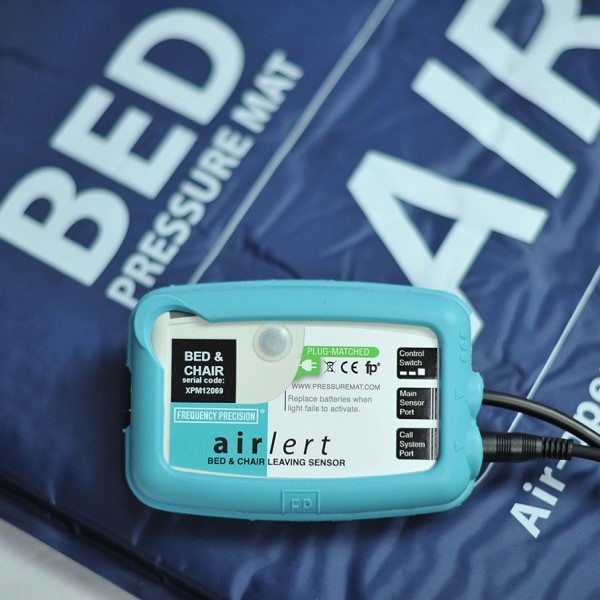Frequency Precision is a company dedicated to applying technical and engineering skills to helping people who may be dependent on others. They have developed a range of sensitive but durable sensors which can help alert carers if someone puts themselves into a potentially dangerous situation.
The story of Frequency Precision started is a personal one: Doug Dwyer’s mother was living in a nursing home and he wanted her to be able call for assistance. However, as an engineer and inventor, he took matters into his own hands and, working in a shed in Devon, he created a pager system for her use.
Subsequently, his mother developed dementia and wasn't aware of the risks of getting up out of bed without assistance. Again, Doug came up with a solution: an air pressure sensor that would go under the mattress. The design was so discreet that his mother didn't notice it but would give her carers early warning if she attempted to get out of bed.
The success of his inventions led to the formation of the company: Frequency Precision.

In simple terms this technology depends on 3 functional elements:
Sometimes more than one function is combined in a single device.
Two groups of people may benefit from activating an alert system:
There are, most commonly, two types of monitoring person in two corresponding situations:
A set-up needs to be designed according to the needs of the person being monitored and those of the person(s) who are doing the monitoring.
The different products listed above can be combined in different configurations to suit particular needs. A few scenarios have been listed below, but we would advise contacting us to discuss your needs whether ‘At Home - For Domestic Carers’ or for a complex multi-user system for a nursing home or hospital.
"My carer lives in the same house as me":
~ A call button or sensor linked to a pager will alert a carer within the range of an average home and garden.
~ A pager is carried by the carer.
~ Quickest response time - the carer is alerted immediately.
~ Low cost - just a one-off payment to buy the equipment. No subscription needed.
"I need to be able to alert my family who lives nearby":
~ A call button or sensor linked to our base station uses your WiFi signal to send a message to a mobile phone.
~ The carer doesn't need to be in the same house.
~ Medium cost - just a one-off payment to buy the equipment. Unlimited messages are included within the cost price.
~ Medium response time - the carer is alerted by receiving a message on their mobile phone.
~ You can add a base station to any of our wireless call buttons or sensors.
"I need somebody else to contact my carer or call an ambulance when I need help":
~ A 24/7 call centre monitor or dialler will notify call centre staff who will alert emergency services.
~ We supply sensors compatible with all monitors/diallers.
~ The monitor/dialler would need to be purchased and installed separately.
"The nursing staff decide which equipment the residents require. If the resident is prone to falling out of their chair they’ll be given a chair mat. If they just want to know if when the get up in the night, or if they are a risk of falling out of bed, they will be given a bed sensor. We also use the floor mats in a lot of different ways. If you put it in front of the bathroom door it will alert you to them using the bathroom, positioned next to the bedroom door it will alert the staff to someone leaving their room."
Andy Dunn, Maintenance Technician - Augustinian Care
A. If you have a long-term medical condition you do not need to pay VAT on most products that we sell. We can advise you this and help you with the simple paperwork.
A. This system is generally extemely reliable, but if you have a problem start by checking that the rubber tubing between the mat and the sensor box is connected. If there is still a problem, try changing the battery in the sensor box and pager. You can always call us at Fortuna Mobility for further advice.
A. The sensors and pagers are supplied ready to use straight out of the box. All batteries are included.
A. No, our sensors are designed to alert a carer within the same property that you need help. They can also be linked to a mobile phone to alert a family member.
A. The wireless range is generally about 200 meters, meaning that the pager can be carried by a carer around the home including in the garden.
A. The pendant and falls watch will only work when you are at home or in the garden. This is because they have to be within range of the pager.
A. As many pagers as needed can be linked to one or more sensors.
A. As many sensors as needed can be linked to one pager.
We stock a wide range of products, with over 1000 lines available in the showroom.
Come and TRY out the products to see what suits your needs.
Our friendly highly-trained staff will help you make a choice which is right for you.
Copyright © 2024 Fortuna Mobility | All rights reserved.